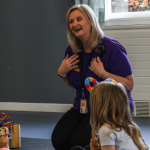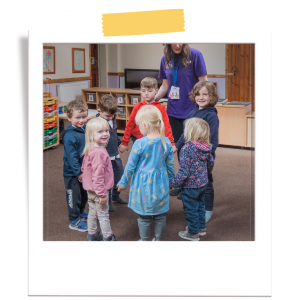
The many types of kindness: Helping children grow with empathy
February 21, 2025
Positive relationships for children: Building bonds that last
March 27, 2025Self-esteem is the foundation of a child’s emotional and social wellbeing. It shapes how they view themselves, interact with others, and approach challenges.
As parents, educators, and caregivers, we play a vital role in helping children build and maintain healthy self-esteem.
So, what exactly is self-esteem? Put simply, it’s the way we think and feel about ourselves. For children, this sense of self-worth develops early in life and is influenced by their experiences, relationships, and environment.
By encouraging confidence and resilience, we can help children navigate life’s ups and downs with a strong sense of self-belief.
Through engaging activities like mindful breathing, relaxation techniques, and discussions about emotions, Mind Marvels helps children develop a strong sense of self-worth.
Why self-esteem matters
A child with healthy self-esteem is more likely to:
- Try new things: They’ll feel confident enough to explore and learn without fear of failure.
- Cope with setbacks: Resilience grows when children believe they can overcome challenges.
- Form positive relationships: A strong sense of self-worth makes it easier to build connections with others.
- Speak up: Whether it’s asking questions in class or standing up for themselves, self-esteem gives children the courage to express their needs.
Conversely, low self-esteem can lead to feelings of inadequacy, anxiety, and withdrawal. That’s why it’s so important to create a supportive environment where children feel valued and capable.
Children often mirror the attitudes and behaviours they see in adults. If you speak kindly to yourself and handle mistakes in a nice way, children are more likely to adopt the same mindset.
Signs of low self-esteem
Understanding the signs of low self-esteem can help you identify when a child might need extra support. Common indicators include:
- Avoiding challenges for fear of failure.
- Frequently saying things like, “I can’t do this” or “I’m not good enough.”
- Comparing themselves unfavourably to others.
- Becoming overly sensitive to criticism.
- Withdrawing from social situations or avoiding eye contact.
If you notice these behaviours, it’s important to approach the child with patience and understanding. Building self-esteem isn’t about making children feel good all the time—it’s about equipping them with the tools to believe in their abilities and bounce back when things don’t go to plan.

Practical Tips for Building Self-Esteem
1. Focus on effort, not outcome
Praise children for their hard work and perseverance rather than just the end result. For example, if a child tries their best in a spelling test but doesn’t get top marks, celebrate the effort they put into preparing. This helps them understand that success isn’t just about winning—it’s about growth and learning.
2. Encourage open communication
Children need to feel heard and understood. Create opportunities for them to talk about their feelings, whether it’s during a quiet moment before bedtime or while doing an activity together. Asking open-ended questions like, “What made you feel proud today?” can encourage them to reflect on their achievements and emotions.
3. Teach emotional awareness
Helping children recognise and label their emotions is a crucial step in building self-esteem. When they understand that it’s okay to feel upset, angry, or disappointed, they’re less likely to internalise those emotions as personal failings. Simple tools like emotion cards or a feelings chart can make this process fun and engaging.
4. Set realistic expectations
While it’s great to encourage children to aim high, setting unattainable goals can do more harm than good. Help them set achievable targets that align with their abilities and interests. Celebrate their progress along the way, no matter how small.
5. Model positive self-talk
Children often mirror the attitudes and behaviours they see in adults. If you speak kindly to yourself and handle mistakes in a nice way, children are more likely to adopt the same mindset. For example, instead of saying, “I’m terrible at this,” try, “This is tricky, but I’ll keep practising.”
6. Encourage new experiences
Trying new activities can be a great way for children to discover their strengths and interests. Whether it’s joining a sports team, learning an instrument, or trying out arts and crafts, each new experience is an opportunity to build confidence and resilience.
7. Create a safe environment
Children do better when they feel safe and supported. This means offering consistent routines, setting clear boundaries, and showing unconditional love. When children know they’re valued for who they are, not just what they achieve, their self-esteem naturally flourishes.
The role of mistakes in self-esteem
Mistakes are often seen as a bad thing, but they’re actually an essential part of learning and growth. When children make mistakes, they have the opportunity to develop problem-solving skills and resilience.
As adults, we can help by reframing mistakes as learning opportunities. Instead of focusing on what went wrong, ask questions like, “What could you try differently next time?” This approach teaches children that failure isn’t the opposite of success—it’s a stepping stone towards it.
When to seek additional support
While most children experience occasional dips in self-esteem, ongoing struggles may require additional support. If a child’s low self-esteem is impacting their mental health, relationships, or schoolwork, it might be time to seek professional advice.
Remember, seeking help is a sign of strength, not weakness—it shows that you’re committed to helping that child.
Final thoughts
Building self-esteem in children isn’t about shielding them from challenges—it’s about helping them develop the inner strength to face those challenges head-on. By offering encouragement, creating a supportive environment, and teaching valuable life skills, we can help children believe in themselves and their abilities.
Remember, self-esteem is a journey, not a destination. With the right support, every child has the potential to grow into a confident and resilient individual.
